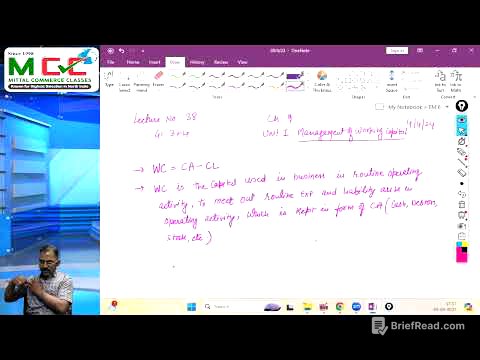TLDR;
This Bloomberg Daybreak podcast discusses the impact of President Trump's decision to pause tariffs on non-retaliating countries and lower reciprocal tariffs to 10%, while raising duties on China to 125%. The podcast explores the market reactions in Asia, Europe, and the US, as well as the potential implications for the Chinese economy and the US-China trade war. The podcast also covers other news stories, including the CPI report for March, the US Steel deal, and the Dominican Republic nightclub collapse.
- President Trump's tariff decision caused a surge in global stock markets.
- The decision is seen as a strategic move to pressure China and potentially reach a trade deal.
- The podcast analyzes the potential impact of the tariffs on the Chinese economy and the US-China trade war.
Market Reactions [0:14]
The podcast begins by discussing the market reactions to President Trump's tariff decision. The S&P 500 rallied 9.5% and the Nasdaq 100 soared 12%, marking the best day for US stocks since 2008. The rally spread overseas, with stocks in Japan, South Korea, and Taiwan surging. Even in China, the Hang Seng Index and the Shanghai Composite recorded modest gains, despite the 125% tariff on Chinese goods. The sentiment in Asia is that investors are breathing a sigh of relief, as the tariffs are being delayed and there is room for negotiation.
European Markets [2:46]
European markets also surged, with the Stoxx 100 up 5% and banks and technology stocks leading the gains. The podcast highlights the significant impact of President Trump's decision on European investors, who are responding positively to the rollback of tariffs.
Wall Street's Reaction [3:27]
The podcast then focuses on Wall Street's reaction to the tariff decision. The S&P 500 ended the day up 9.5%, with traders describing the news as "total shock and awe." The podcast notes that the decision came after a frenetic meeting with economic advisors, who were watching the bond market closely. The 10-year Treasury saw the biggest three-day jump since 2001, indicating a potential worst-case scenario for the US economy.
Goldman Sachs Recession Forecast [4:58]
Goldman Sachs economists have rescinded their forecast for a US recession following President Trump's announcement of a 90-day pause on tariffs. The podcast explains that the economists initially called for a recession but changed their forecast after the president's decision.
CPI Report [5:38]
The podcast then discusses the upcoming CPI report for March, which is expected to show relatively tame inflation. However, investors will be looking for signs of impending tariff price increases, as goods prices have suddenly reversed course.
Metals Rebound [6:27]
Metals rebounded this morning, halting their longest run of daily losses in 25 years. Copper is up 5%, aluminum is higher by 3%, and tin is surging more than 6%. The podcast also mentions that shares of US Steel are down 11-12% in early trading, following President Trump's statement that he does not want to see the steelmaker owned by a Japanese company.
Other News [7:02]
The podcast then covers other news stories, including House Speaker Mike Johnson's attempt to pass the Senate-approved Republican budget blueprint, the death toll from the Dominican Republic nightclub collapse, and the case of Kilar Abrego Garcia, a Maryland man who was allegedly deported by accident to El Salvador.
Bloomberg Sports Update [9:21]
The podcast concludes with a Bloomberg Sports Update, covering the Masters Tournament, MLB games, and NHL playoffs.
President Trump's Tariff Strategy [11:11]
The podcast then delves into President Trump's tariff strategy, discussing the 90-day pause and the potential impact on the US-China trade war. Bloomberg News trader Brendan Murray explains that the decision was likely driven by pressure from the financial markets, which were showing signs of a potential credit crunch.
China's Response [13:05]
The podcast explores China's response to the tariff decision, noting that the country is already actively trying to develop better ties with countries in Latin America, Africa, and Europe. China is also less dependent on the US market than it was five years ago, but it will need to diversify even more quickly to avoid economic headwinds from the tariffs.
Leverage in the Trade War [14:31]
The podcast discusses the leverage that China has in the trade war, highlighting that the country can limit the amount of raw materials, machinery, and critical minerals that American companies need to produce their goods. China can also target US companies operating in China through regulations and taxes.
Isolation Strategy [15:46]
The podcast explores the deeper meaning behind President Trump's isolation strategy, suggesting that it is intended to put pressure on other countries and their relationships with China. The podcast argues that the Trump administration realized it needs its allies to stand up to China and that imposing high tariffs on everyone would be counterproductive.
Negotiation Timeline [16:24]
The podcast discusses the timeline for negotiations, noting that 90 days is a very short time frame for reaching trade agreements. Trade agreements typically take years to negotiate, as there are thousands of pages of legal details to be hammered out.
Market Outlook [17:28]
The podcast then turns to the market outlook, discussing the potential impact of the tariff decision on companies' first-quarter results. Dan Morris, chief market strategist at BNP Paribas Asset Management, explains that while the first-quarter results will provide some insight, investors should focus on companies' guidance for the future.
Bond Market Impact [19:47]
The podcast explores the role of the bond market in President Trump's decision to pause tariffs. While the bond market did see significant moves, the podcast argues that it is debatable whether the market's impact on the decision was decisive.
GDP Components [20:41]
The podcast discusses the components of GDP, focusing on consumption, investment, and government spending. The podcast highlights the importance of consumer demand in the US economy and the potential impact of the 10% tariffs on consumer spending.
Market Volatility [21:32]
The podcast acknowledges the volatility in the markets, noting that the market is trying to assess the impact of the tariff decision on both the US and Chinese economies. The podcast emphasizes the uncertainty surrounding the duration of the tariffs and the potential for negotiation.
Recession Risk [23:12]
The podcast discusses the recession risk, noting that the possibility of a recession was always present under the assumption that the previous tariffs would stay in place indefinitely. However, with the pause in tariffs, the podcast does not anticipate a meaningful recession risk.
S&P 500 Year-End Call [23:36]
The podcast concludes with a year-end call for the S&P 500, suggesting that if the US reaches an agreement with China, US growth should continue to be positive, leading to higher earnings and equity prices.









